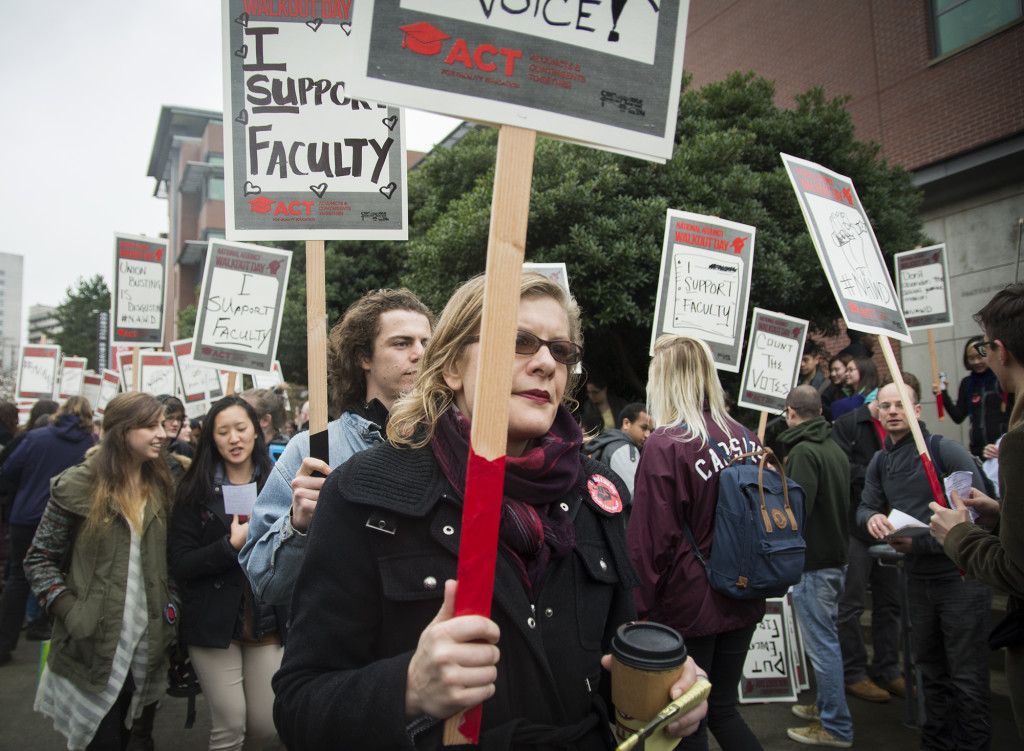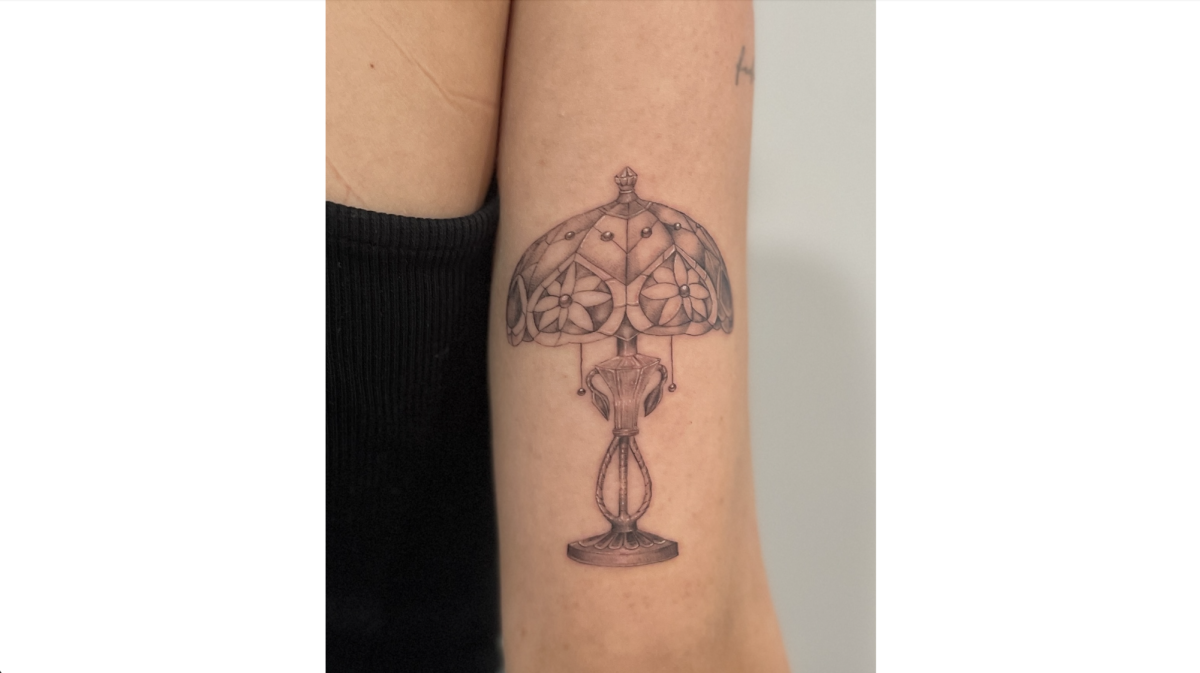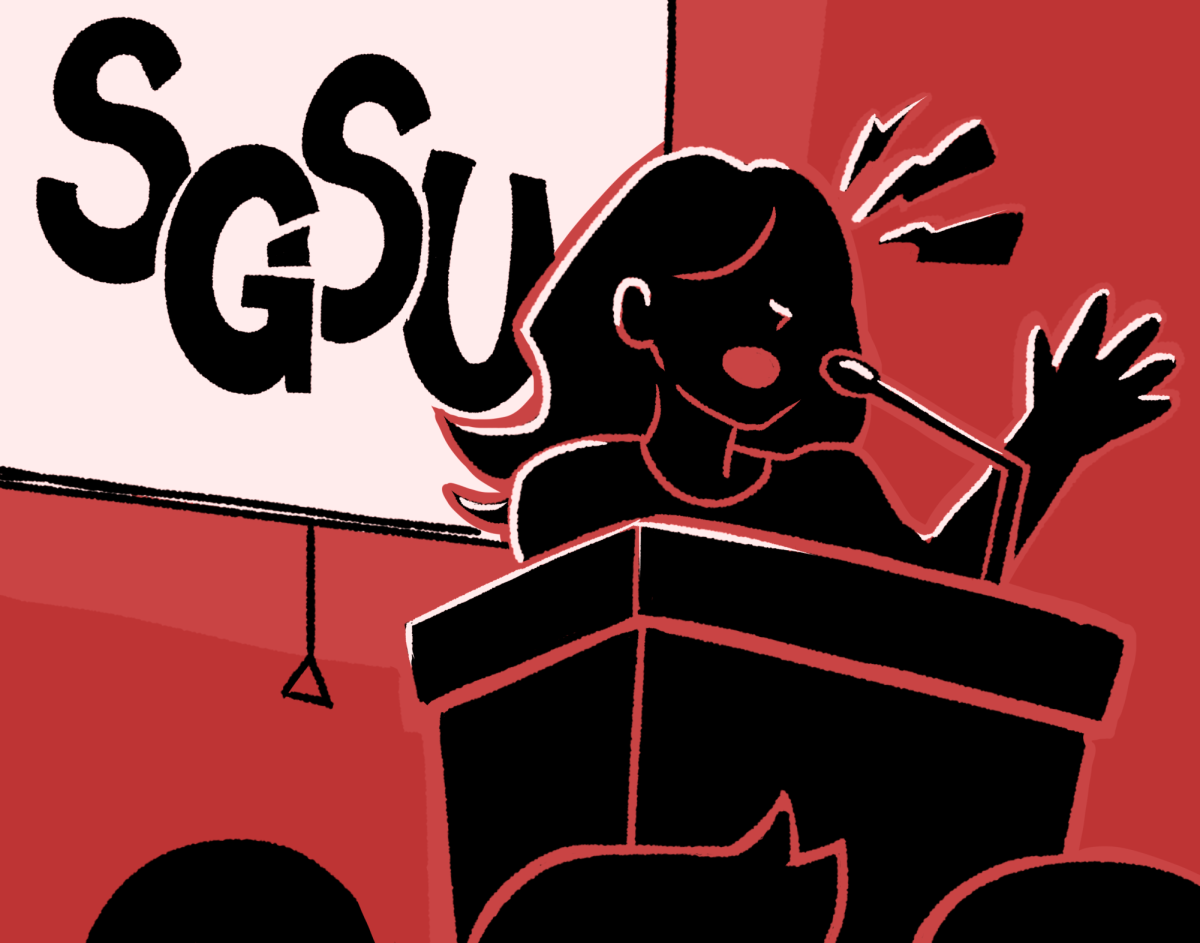AN UNSETTLED IDEAL
Dr. Jerome Veith, an adjunct philosophy professor, is no stranger to Jesuit education. He attended Seattle University for undergrad and received his doctorate from Boston College, both experiences that lend him a useful empathy for the students he teaches now.
“I really feel that I still identify with the students very well,” Veith said. “I can still remember wondering: what does social justice mean? Because it can be vague, it can seem like something distant, or only for the missionaries among the students.”
And of course social justice is vague. Reasonable people can interpret its meaning in profoundly different ways. So perhaps the role of a Jesuit university is to reckon with the ambiguities of social justice, to ferret out the genuine ideals from the merely seductive ones, and to contemplate how this core Jesuit ideal connects with our lives. Whatever the reality, it is this pallet of questions that Veith engages in his own life, and the one he offers to his students in the classroom.
But these are not questions confined to a core philosophy class. At least not at Seattle U. The ways we think about social justice seep into the identities of students, professors and administrators. For many, including the school’s Jesuit president, it’s a central tenet of their worldview. And in the debate over unionization these colors pour out it in a messy way, colliding all at once on a blank canvas and painting a seemingly complicated picture.
A TENSE DEBATE
Last week the rain fell in that classic Seattle way while pro-union supporters marched along 12th Ave., passing the law school and weaving onto the lower mall. A palpable conviction rested over the group. The tension, it seems, had been building for sometime.
Students, faculty and other members of the surrounding community poured onto campus in numbers unseen at any demonstration in the recent history of Seattle U politics.
There were those who laughed, reveling in the camaraderie and showing support but who might not be directly burdened by the issue at hand. Meanwhile, other faces held stern. For adjunct professors, the status of higher education in the United States has varying implications which span from mere inconveniences to dire life situations, including poverty and even homelessness.
The campus walkout took place under the banner of a nationwide protest meant to draw attention to the troubling conditions that many adjunct faculty across the country face. Adjunct faculty comprise part- and full-time professors without the possibility of tenure, and they occupy a tenuous position in a market flooded with newly minted Ph.D.s. It’s a market where job security is sparse, pay is low, and where expendability and exploitation are rife.
Seattle U, a Jesuit institution with a proven commitment to social justice, is not immune to the forces shaping the modern university. Like the general trend in higher education, Seattle U relies upon adjunct faculty to teach a significant portion of its courses. In other words, the school has evolved to a point where it is increasingly dependent on these professors to fulfill Seattle U’s highest aspiration: to help form young minds under the auspices of a Jesuit-inspired mission.
The debate is fraught with passion, bitterness, insecurity and mistrust. Identifying where truth lies amid all the noise is exceptionally difficult. The rhetoric on both sides of the issue is different in tone, but their convictions are comparably fervent. And the divisiveness between the core union supporters and their opponents in the administration seems to be growing.
The pro-union side is represented by a coalition of part- and full-time adjunct faculty, tenured professors, students, and even Seattle’s $15 minimum wage pioneer Kshama Sawant, a former adjunct professor at Seattle U and current city councilwoman. Their disposition is loud and becoming louder, especially as the administration considers its next legal move.
Right now, both camps are in a state of limbo. It remains unclear how the school will respond to a legal precedent recently set in a unionization case at Pacific Lutheran University in Tacoma, where a union scenario similar to Seattle U’s is unfolding. The National Labor Relations Board, the arm of the federal government that oversees union jurisdiction, ruled that PLU’s full-time non-tenure track faculty are not “managerial employees” and therefore have the right to unionize. And, perhaps more importantly, the NLRB also ruled that the school’s religious association does not bar its faculty from unionizing.
On the administration’s side of the equation are people like Provost Isiaah Crawford and President Stephen Sundborg S.J., who some consider the faces of union opposition at Seattle U. Even as many union supporters scoff at the religious freedom component of the administration’s legal argument, both Crawford and Sundborg seem genuinely concerned with what a union could mean for Seattle U’s mission—the school’s guiding light and existential anchor.
THE ADJUNCT STRUGGLE
For adjuncts, the question centers on livelihood. It’s a concern for just compensation, good working conditions, and dignified treatment and representation. Unionization, they argue, has clear social justice outcomes and thus reflects and reinforces the mission.
Veith, the adjunct philosophy professor, wanted to return to Seattle partly because he missed the familiar faces in the faculty, the ones still grappling with the meaning of a Jesuit liberal arts education. This was home, and it continues to be, but recently disillusionment has crept in.
“The more I work here, the more I also see facets of it that are alienating, that I didn’t see when I was a student, and that I really didn’t expect to encounter,” Veith said.
One facet involves his salary and contract. Veith is full-time and believes that his compensation is not representative of the effort he puts forth. He often works seven days a week, and with students frequently reaching out over email with questions, it can feel like he’s constantly on call. He recognizes that to some extent it’s his own choice.
“Part of the reason that we’re such exploitable labor is because we care so much about what we do,” Veith said.
He said that his contract is “utterly precarious” and can be ended any time for any reason within the limits of the law. When budget cuts went through earlier this year, he feared it could have ended his career.
Despite these cuts, salaries for full-time adjuncts have actually improved significantly over the last half decade. Once Crawford entered the scene as provost six years ago, he helped lead a market equity program of about $5.6 million meant to raise salaries to competitive levels for full-time adjuncts. He also worked to increase the per-course salary for part-time adjuncts.
From the administration’s perspective, gratitude for these improvements seems thin. Crawford said it’s unfortunate that some have suggested that no progress has been made in certain areas. Those claims, he said, are just not factually correct.
Barring the seeming disconnect, conversations with adjuncts for this story reflect an honest appreciation for the administration’s efforts to get them more money and to provide them with more say in faculty governance. But these improvements don’t go far enough, adjuncts said. The market, some argue, is not necessarily the most just barometer of fairness.
They are still frustrated with how the administration has acted throughout this process. In their view, the relevant players of the administration have been aloof and disconnected. Veith and others said that a letter delivered last year from pro-union supporters to President Sundborg requesting a congenial dialogue about their concerns never received a response.
Another part of the tension for Veith involves community. From quarter to quarter, his office’s location is constantly in flux. The perpetual shifting makes certain logistics difficult, and his friendships with other faculty members suffer because of it. Those relationships are sporadic and limited (and the unpredictable floating can affect his students, too). He said that between the adjuncts and the tenured faculty there is sometimes a “strange gulf,” a fact that’s only exacerbated by him being barred from attending department meetings, which means his voice is often a silent one.
Many adjuncts reject the notion that they have any meaningful influence on campus. Attempts to air grievances directly have had limited success. Nor has substantial change occurred through the recently-attained representation for part-time adjunct faculty on the Academic Assembly, the school’s system of faculty governance.
“[Many adjuncts] just don’t feel like the university cares about them, so they don’t want to participate,” said Dr. Michael Ng, a part-time adjunct history professor who also serves on the Academic Assembly. He commended the steps that the Academic Assembly has taken to increase part-time adjunct representation, and he’s grateful for the two thousand dollar stipend he receives for his service. But the administration’s piecemeal response to adjunct concerns remains disheartening. “We’re sort of fixing things as they come,” Ng said. “There’s this lack of uniformity.”
Ng listed a slew of reasons that contribute to the increasing divide between union supporters and the administration, including concerns over academic freedom, budget transparency and the precarious employment statuses of some staff members and adjunct colleagues.
“[The administration] knows they have united people, in a way, against them,” he said.
GROWING SUSPICION
Merge these concerns with financial uncertainty at the university and it makes some sense why a burgeoning culture of fear exists among the adjunct faculty. Adjuncts’ jobs rest on a delicate foundation, and they can collapse in a moment’s notice for reasons that range from a bureaucratic slight to a budgetary crisis. And this insecurity can manifest in troubling ways. Some argue it can lead to concern about what’s appropriate to say, which has potentially dangerous implications for academic freedom.
But the fear runs deeper in some cases. A handful of adjunct professors and student supporters share the suspicion that certain professors’ contracts may not have been renewed this year because of their roles in the unionization efforts.
These claims are difficult to substantiate, but some adjuncts argue that they are neither outlandish nor unreasonable. At least one faculty member interviewed for this story—an outspoken supporter of unionization—received correspondence suggesting that his advancement at this university could be in danger.
FACE OF SOCIAL JUSTICE
The ideals of this university may inevitably clash with economic realities. But no one said living up to the mission would be easy. And perhaps no one knows this better than the Jesuit president of this social justice institution himself.
“If there’s one thing that I believe that I’ve made the greatest contribution to Seattle University, it’s about our mission,” Sundborg said.
The burly Jesuit speaks softly and eloquently and always with a seeming self-assurance. He thinks carefully and deliberately, fielding questions from this young reporter with an unwavering respect.
For 18 years, he has worked to galvanize a university around a social justice mission that he holds dear to his heart. Few would openly question this devotion. He has an extensive track record of standing for justice, one that extends from a commitment to fighting homelessness to his public support for undocumented students to the proven and important accomplishments of the Seattle University Youth Initiative. Acknowledging that this school’s mission is a crucial dimension of the Seattle U identity seems to require a certain appreciation for the man who helped shape it. Sundborg is the face of social justice for Seattle U not simply because he’s president, but because he’s earned it, and that truth comes with high expectations.
Any appearance of impropriety or aloofness on his part will naturally unnerve the teachers he expects to deliver the mission and the students he hopes will carry it forward. That does not mean that disappointment and anger are not justified. But even saints can slip.
Sundborg admits that there is still work to be done to improve the lives of adjunct faculty members. He acknowledges that the communication between adjuncts and administration has not “been adequate.”
“I think there’s been dialogue there, I think there’s been conversation,” Sundborg said. “I don’t think there’s been enough.”
And he wishes there could be more.
“We can admit that without any kind of chagrin in saying that,” he said.
Sundborg’s reluctance to support a union appears to be rooted in reasonable skepticism. He wonders aloud about the impact of a union on teachers in regard to carrying out the mission. He wants to be particularly careful that, once he’s moved on from Seattle U, his successor can continue to foster the school’s mission.
“I’m concerned about a union blocking something that’s essential to us as a Jesuit university,” he said.
His concern shows in deliberative Jesuit fashion. He asks questions: What is the reality of adjuncts’ work? Of their compensation? Of their voice within the university? Again, he stresses the importance of dialogue and of needing to adjust, change and improve. But he simply does not believe that a union can carry that conversation forward.
Some suggested that his opposition is less about reasonable skepticism than it is paranoia and paternalism.
Dr. Erik Olsen, a tenured political science professor and member of the Academic Assembly, posited that a union could provide the opposite of what Sundborg fears, especially given the increasing financial strains on the university.
“There is the added possibility, or hope, that through the collective bargaining process the mission of the university will be reinforced in a way that’s in keeping with academic freedom, respect for all faculty, and respect most of all for our central mission of teaching,” Olsen said.
Sundborg and Crawford both argue that faculty governance is the best way to address the issues being raised by adjunct faculty members. But Olsen does not think the two need to be mutually exclusive, and he believes they can exist harmoniously without impeding the governing role of the Academic Assembly or harming the school’s mission.
Others said that Sundborg’s tone in response to the unionization efforts has been “patronizing.” Last year, for example, a video message sent from the president’s office outlining his opposition was off putting to some adjunct faculty. That includes Ng, who claimed that the video not only seemed insulting to his intelligence, but also that it spread misinformation.
Adjuncts argue that what’s best for them is a union; Sundborg sees it differently. The indication that he knows better is understandably aggravating for pro-union supporters. But for Olsen, it’s worse than tone. He said that the administration is acting paternalistic by denying adjunct faculty a fundamental right—one enshrined in the Universal Declaration of Human Rights and rooted in Catholic social teaching.
Even still, in Sundborg’s view what lies in the unionization crosshairs is a threat to a guiding principle that informs his life and the institution he helped form.
But for the adjuncts, what should be gnawing at Sundborg’s contemplation is the real possibility that a union may not pose a threat at all.
The debate is far from settled. Sundborg’ deliberation will continue, and the demands from adjunct faculty are bound to grow louder. To quell the tides, the Seattle U president may need to reach out more meaningfully to adjuncts and re-enter the realm of respectful dialogue.
Or he may simply need to trust that their devotion to the mission runs as deeply as his.
Mason may be reached at [email protected].











